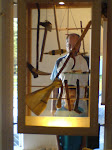She writes:
“Dana Jack has observed that ‘mind and self come into being throughAs it has been (and still is) with the neurasthenics and burn out/exhausted!!! As an individual disease, rather than as the result of an ingrained social disorder, as Freyd also means.
communication with others. One cannot heal the self in isolation. The healing
role of communication in psychotherapy may partially relate to the recording of
sensory and affective information in shareable ways, just as the original
traumatic amnesia may relate to blockage of such recording. By talking or
writing about the traumatic memories, the client spontaneously creates an
episodic interpretation and integration of previously disjointed sensory and
affective memories (see also Herman1992; Nelson 1993; Pennebaker 190; Squire
1992). /…/ Some people seem to be able to do this sort of narrative
recording without actually speaking to a therapist or a trusted other. For some
it is enough to write the words down, or even to engage in mental dialogue about
the memories, although for most people actual communication is important. The
power of language is not only the external act, but it is also the internal act
– the use of ‘voice’ to reconstruct, to recode, to make new connections [I jump
the discussions about policy round these things; societal change etc.] /…/ [it
is] sometimes essential to focus on healing before looking outward to the world.
At other times it is necessary to change, or at least escape from, a toxic
environment before healing can occur. And sometimes action on both fronts is
required.
There is a long sad history of psychiatry and other mental health
fields silencing women and victims of oppression and abuse. Many ‘healing’
interventions can be understood as designed to cover up the very symptoms that
point toward the oppression and victimization of women, children, and others /…/
in too many cases the professionals endowed with the power of professional
psychiatry or psychology not only implicitly cover up oppression and
victimization but in some cases also exploit and sexually abuse their female
patients [and abuse and violate their clients emotionally, yes, in some cases
commit emotional rape!!??] /…/ the therapists who may acknowledge oppression and
victimization within the therapy room take no role in promoting or encouraging
political reform. I believe that this tendency of even gifted healers to avoid
political activity and to infantilize women victims of interpersonal crimes may
have its rots in the forces that have allowed psychiatry to silence victims of
oppression and violence (see Masson 1988 for an insightful and provocative
critique of psychotherapy). When the goal of therapy is reintegration into
society, the assumption is that it is the individual who must adapt, and the
society that is healthy.”
She continues:
See earlier blogposts about narratives. I would also want to write about how Bosch resonates round the use of “safe places” in therapy and what that can cause and if it is necessary at all, and how she looks on children and their anger.“While I agree with many of the concerns raised by critics of therapy, I
believe that some therapy relationships can play an important role in some
survivors’ recovery. Perhaps the crucial factor for recovery is that the abuse
survivor have a relationship (whether with a therapist or someone else) in which
the truth can be told without recrimination, a relationship in which the
survivor can trust that the truth will be heard and believed without the
listener’s subsequently abusing his or her power. According to Jonathan Shay,
‘Healing from trauma depends upon communalization of the trauma – being able
safely to tell the story to someone who is listening and who can be trusted to
retell it truthfully to others in the community’.”
A sidetrack and short note: Veterinaries seem to be afraid of standing on the animal’s side in animal protecting matters because they are afraid of losing customers according to my brother who works with animal care (he is agronomist)…
-//-
Jennifer Freyd skriver också om kommunikation och berättande i sin bok ”Betrayal Trauma – the Logic of Forgetting Childhood abuse” i kapitlet ”Creating connections – Injury and Recovery” på sidorna 170 och framåt.
Hon skriver:
“Dana Jack har iakttagit att ’själ och själv blir till genom kommunikation med andra. Man kan inte hela självet i isolering. Den helande rollen hos kommunikation i psykoterapi kan delvis sättas i samband med inregistrerande av sensorisk och känslomässig information på ett sätt som kan delas, precis som den ursprungliga traumaamnesin kan relateras till en blockering av sådant inregistrerande. Genom att tala eller skriva om traumatiska minnen, skapar klienten spontant en tillfällig/episodisk tolkning och integration av tidigare osammanhängande sensoriska och känslomässiga minnen (se också Herman 1992, Nelson 1993, Pennebaker 1990, Squire1992). /…/ En del människor verkar kunna göra denna sorts berättande (in)registrerande utan att alls prata med en terapeut eller annan person man har förtroende för. För en del är det tillräckligt att skriva ner orden, eller bara att engagera sig i en mental dialog med minnena, men för de flesta människor är faktisk kommunikation viktig. Makten i språket är inte bara yttre agerande, utan det är också en inre handling – användandet av ’röst’ för att rekonstruera, koda om, skapa nya förbindelser /…/ [det är] ibland väsentligt/oundgängligt att fokusera på helande innan man tittar utåt mot världen. Andra gånger är det nödvändigt att ändra, eller åtminstone fly från/undslippa, en förgiftad omgivning innan helande kan ske. Och ibland krävs agerande på båda fronter.Som det har varit och fortfarande är med neuroastenikerna och de ”utbrända”!!! Som en sjukdom hos individen snarare än som resultatet av en djupt förankrad social sjukdom, som Freyd skriver.
Det finns en lång och sorglig historia inom psykiatrin och annan mental hälsovård med tystande av kvinnor eller offer för förtryck och övergrepp. Många ’helande’ interventioner/åtgärder kan ses som ämnade att dölja exakt de symtom som pekar mot förtrycket och återoffrandet av kvinnor, barn och andra /…/i alltför många fall så inte bara döljer professionella, förlänade med psykiatrins eller psykologins makt, förtryck och återoffrande underförstått, i vissa fall utnyttjar och sexuellt förgriper de sig på sina kvinnliga patienter /…/ terapeuterna som skulle kunna erkänna förtryck och återoffrande i terapirummet tar inte på sig rollen att befordra/främja eller uppmuntra politiska reformer. Jag tror att denna tendens även hos begåvade helare att undvika politisk aktivitet och att infantilisera kvinnor som är offer för mellanmänskligt våld kan ha sina rötter i krafter(na) som har tillåtit psykiatrin att tysta offer för förtryck och våld (se Masson 1988 för en insiktsfull och provokativ kritik av psykoterapi). När målet är återintegration i samhället, så förutsätts det att det är individen som ska anpassa sig och att samhället är friskt.”
Hon fortsätter:
“Medan jag håller med många av de bekymringar (???) som rests av kritiker till terapi, så tror jag att en del terapirelationer kan spela en viktig roll i vissa överlevares återhämtning. Kanske är den avgörande/kritiska faktorn för återhämtning att överlevaren efter övergrepp har ett förhållande (vare sig det är med en terapeut eller någon annan) i vilken sanningen kan berättas utan att bli motbeskylld, en relation i vilken överlevaren kan lita på att sanningen kommer att bli hörd och trodd utan att lyssnaren senare/efteråt missbrukar sin makt. Enligt Jonathan Shay, ’Helande från trauma hänger på gemensamgörande (???) av traumat – att tryggt kunna berätta historien för någon som lyssnar och som man kan lita på kan återberätta denna sanningsenligt till andra i gemenskapen’.”Se tidigare blogginlägg om berättelser och berättande.





























Inga kommentarer:
Skicka en kommentar